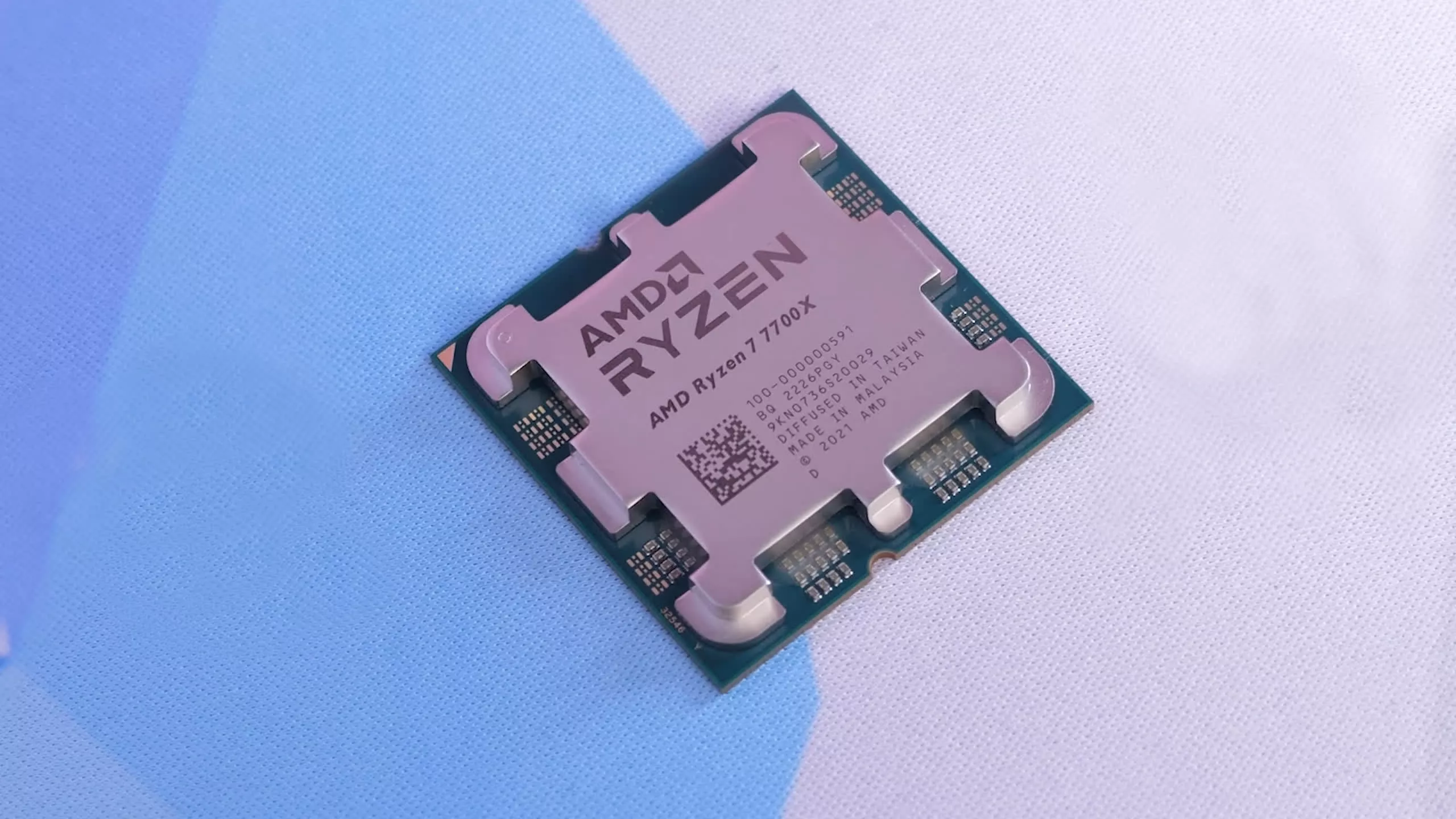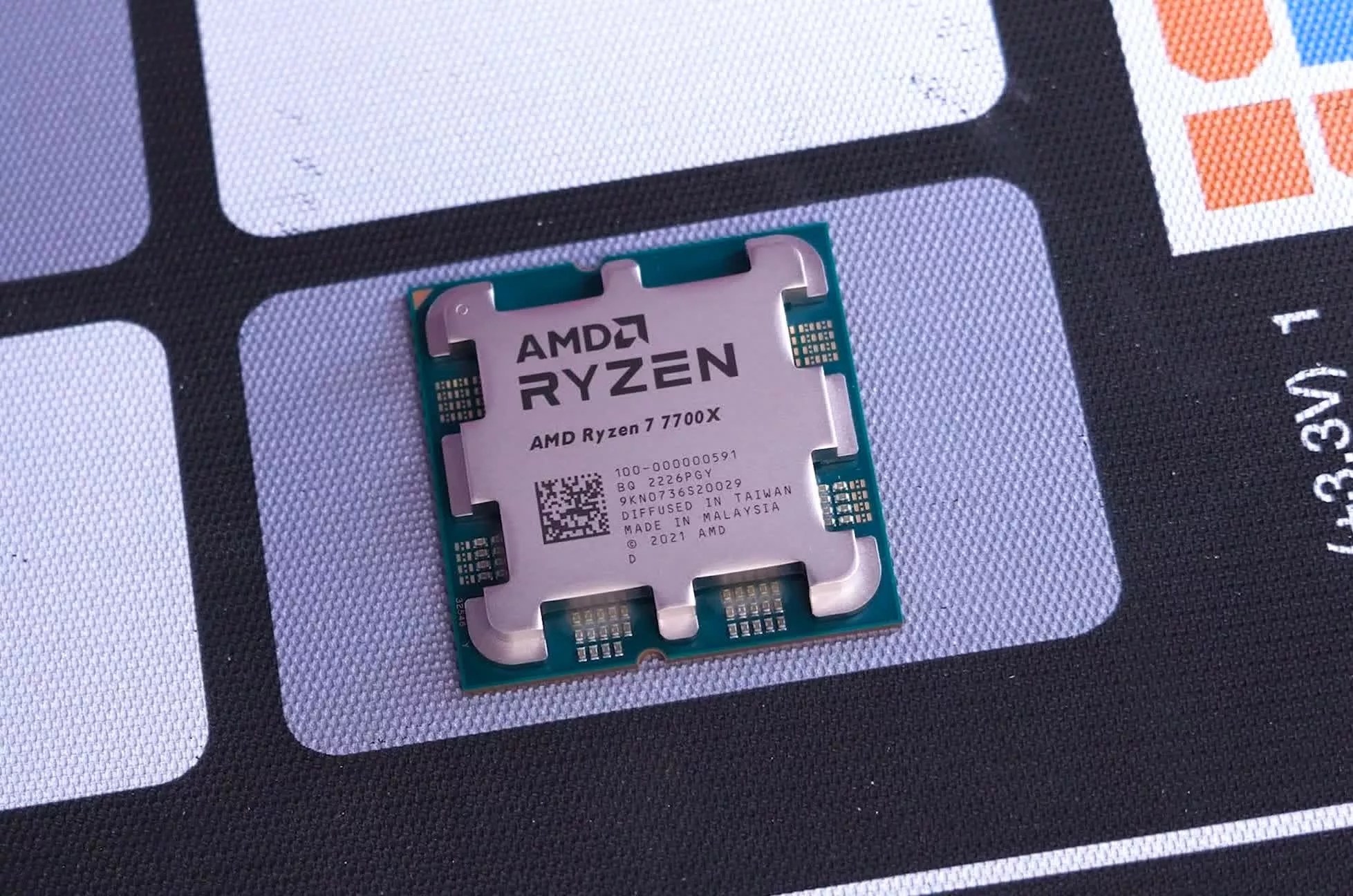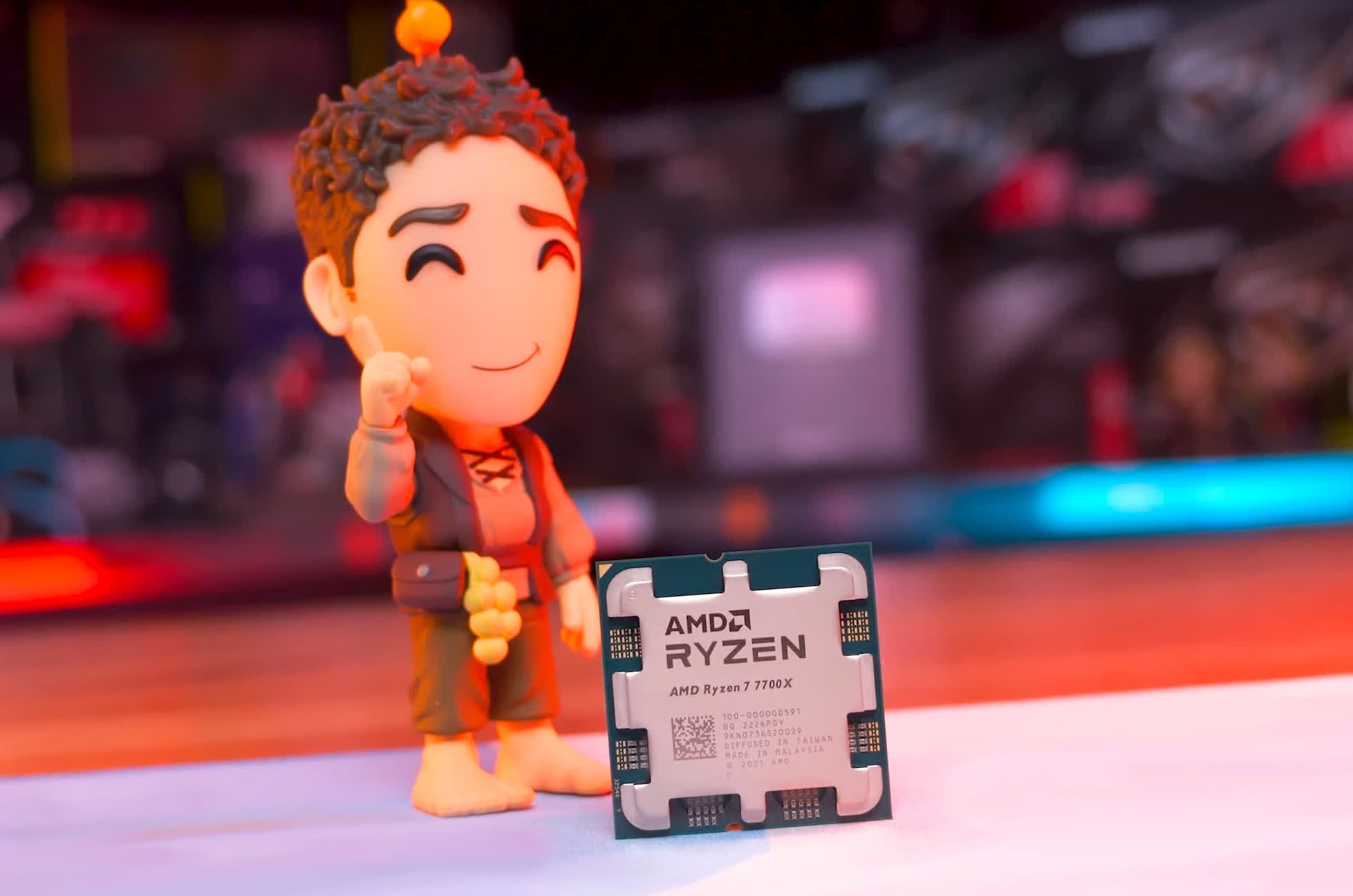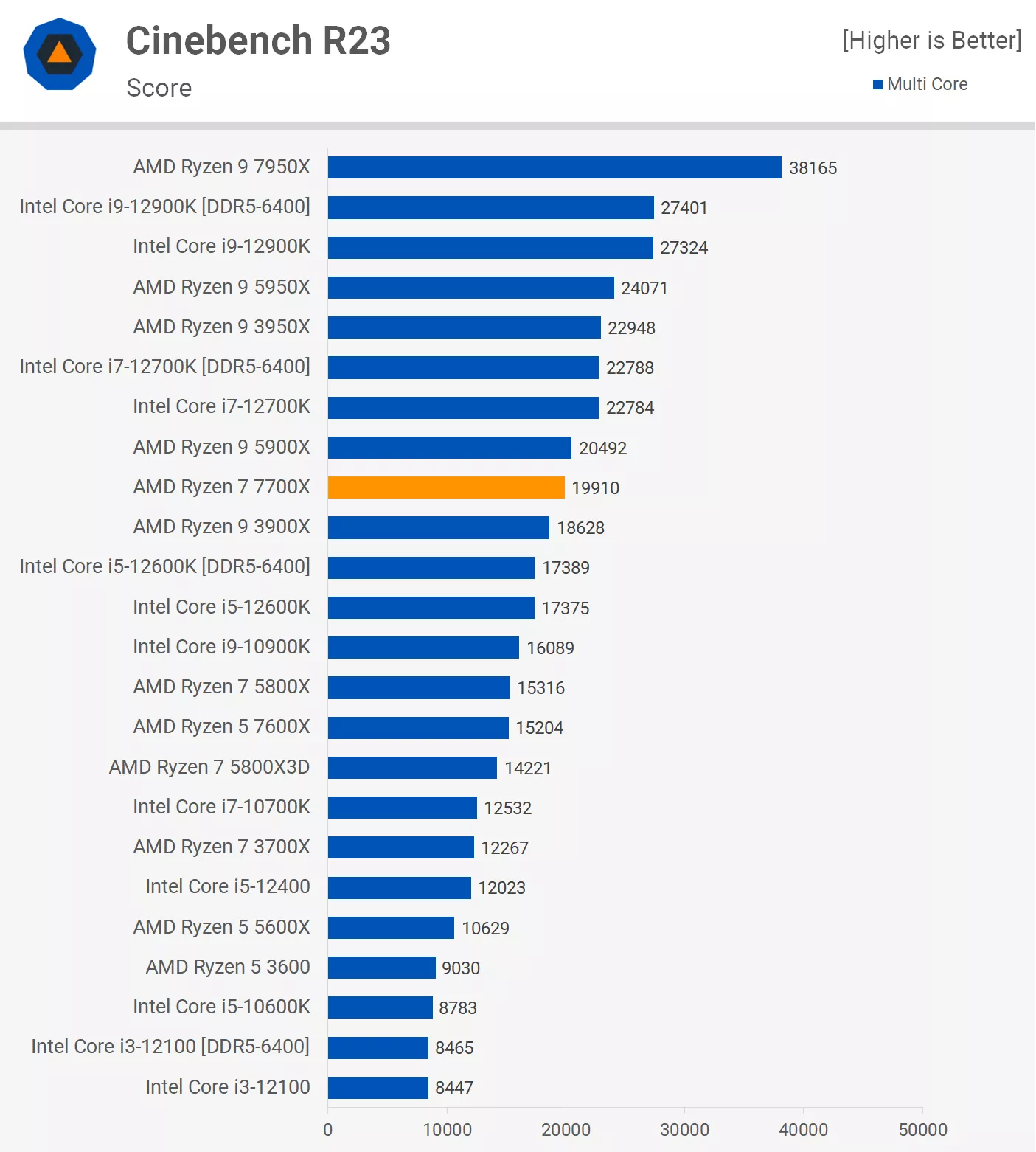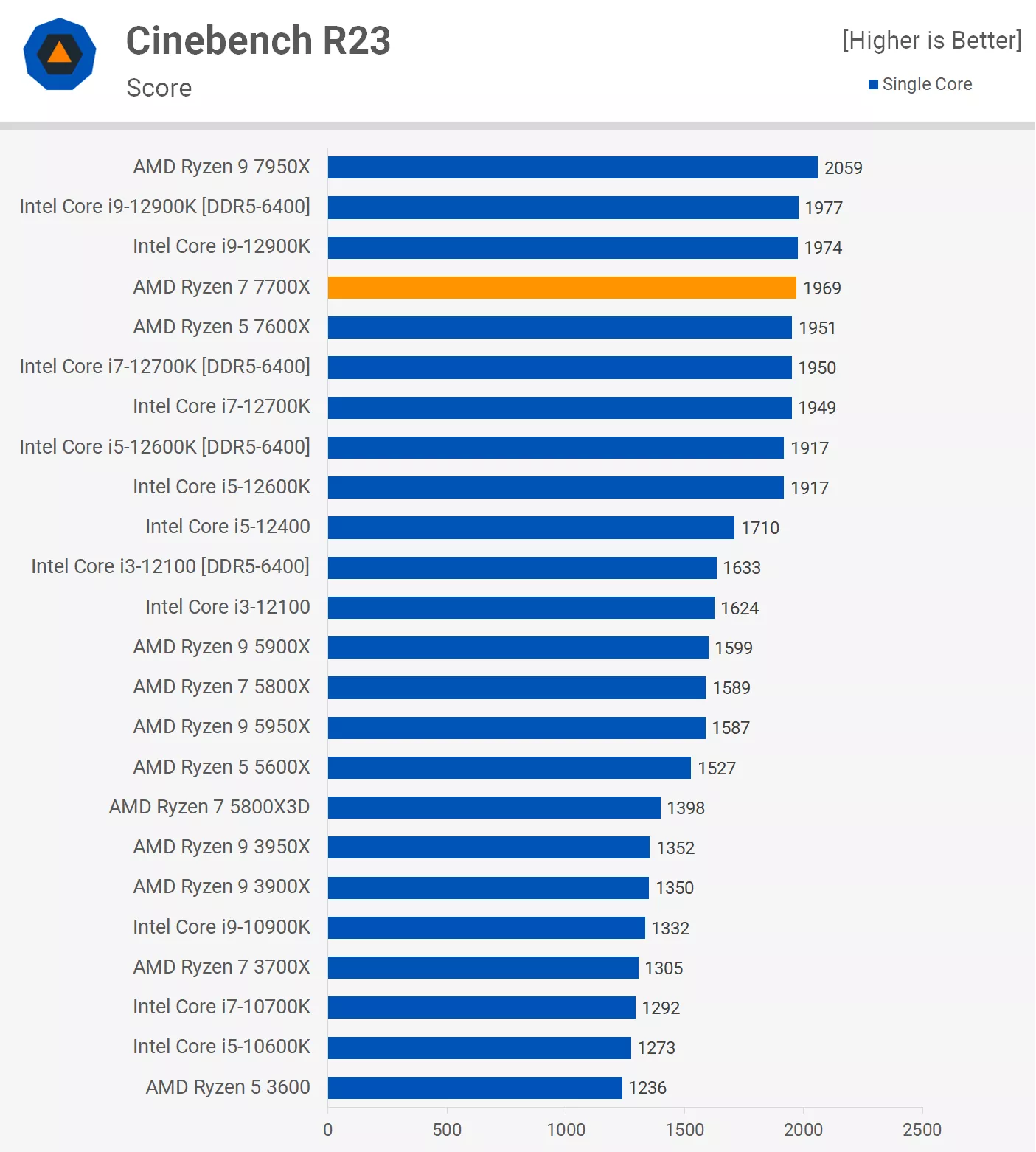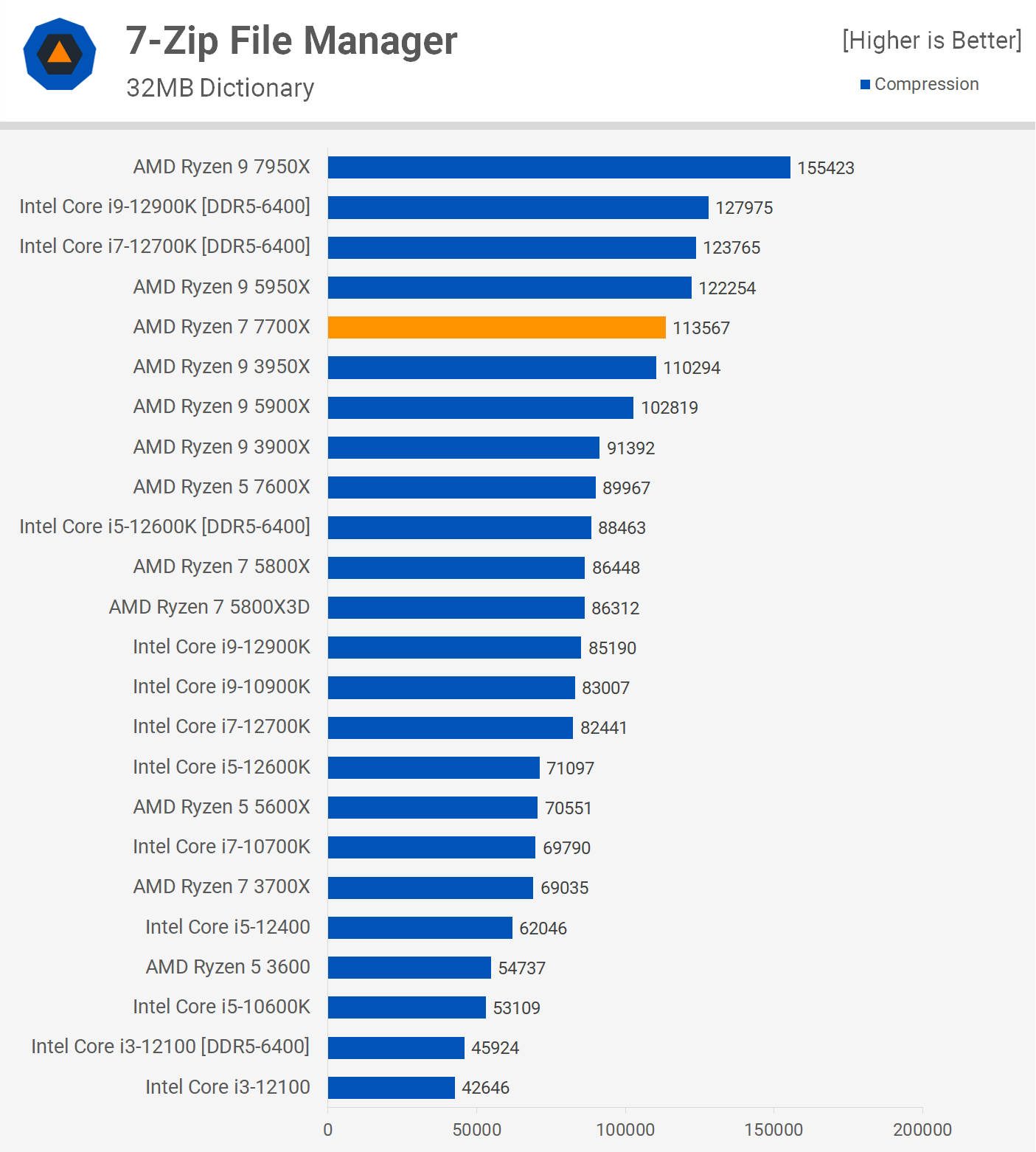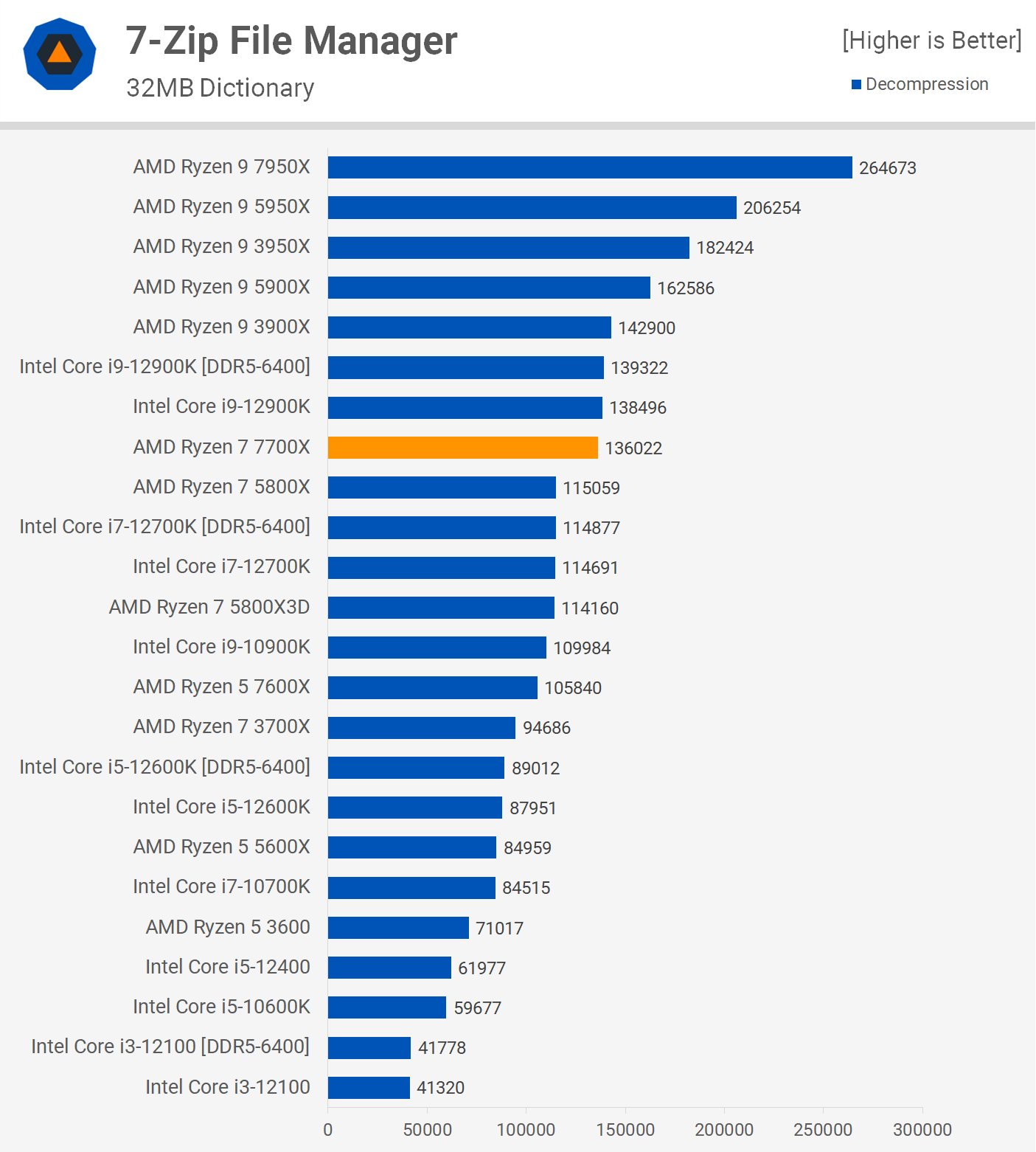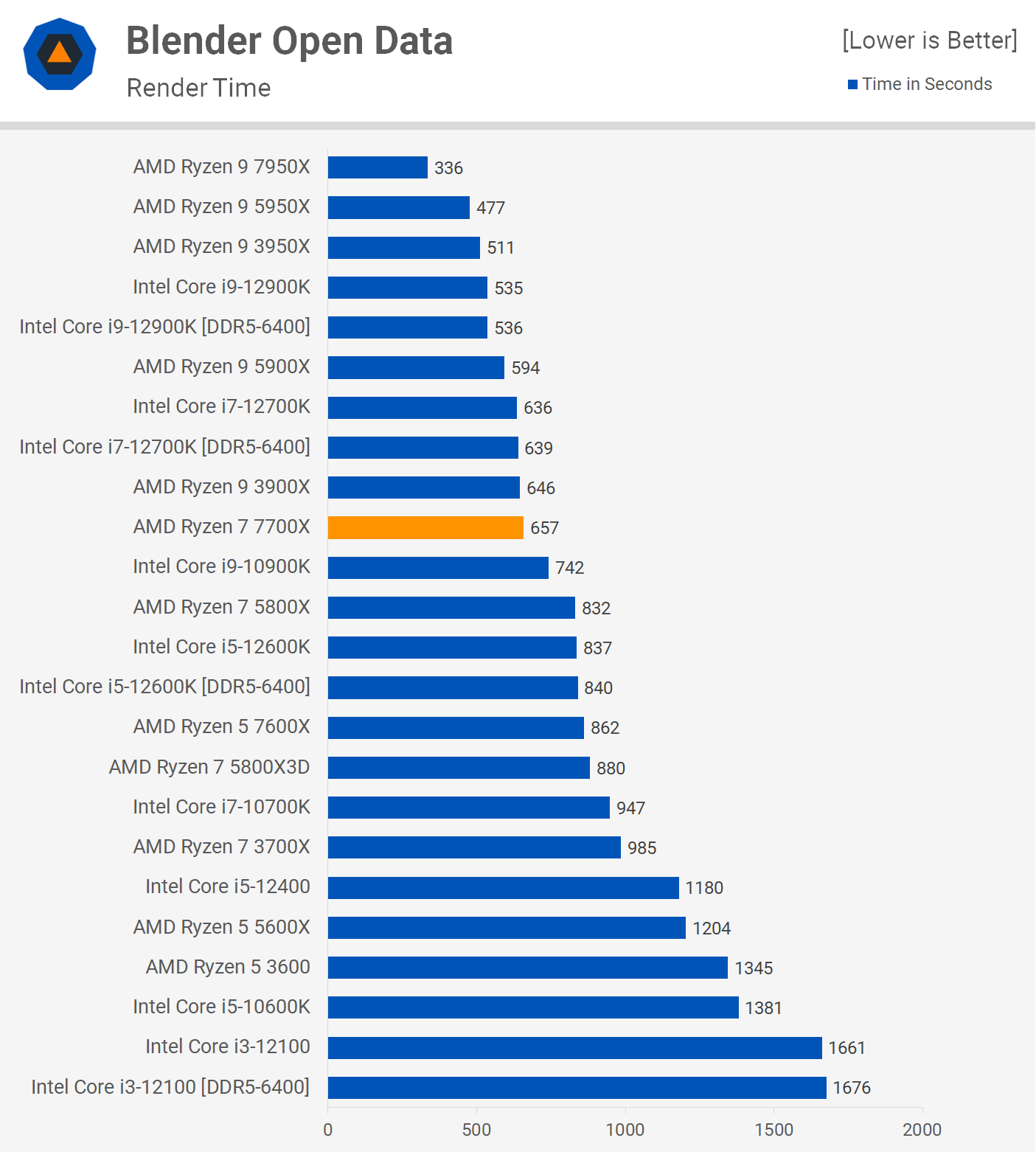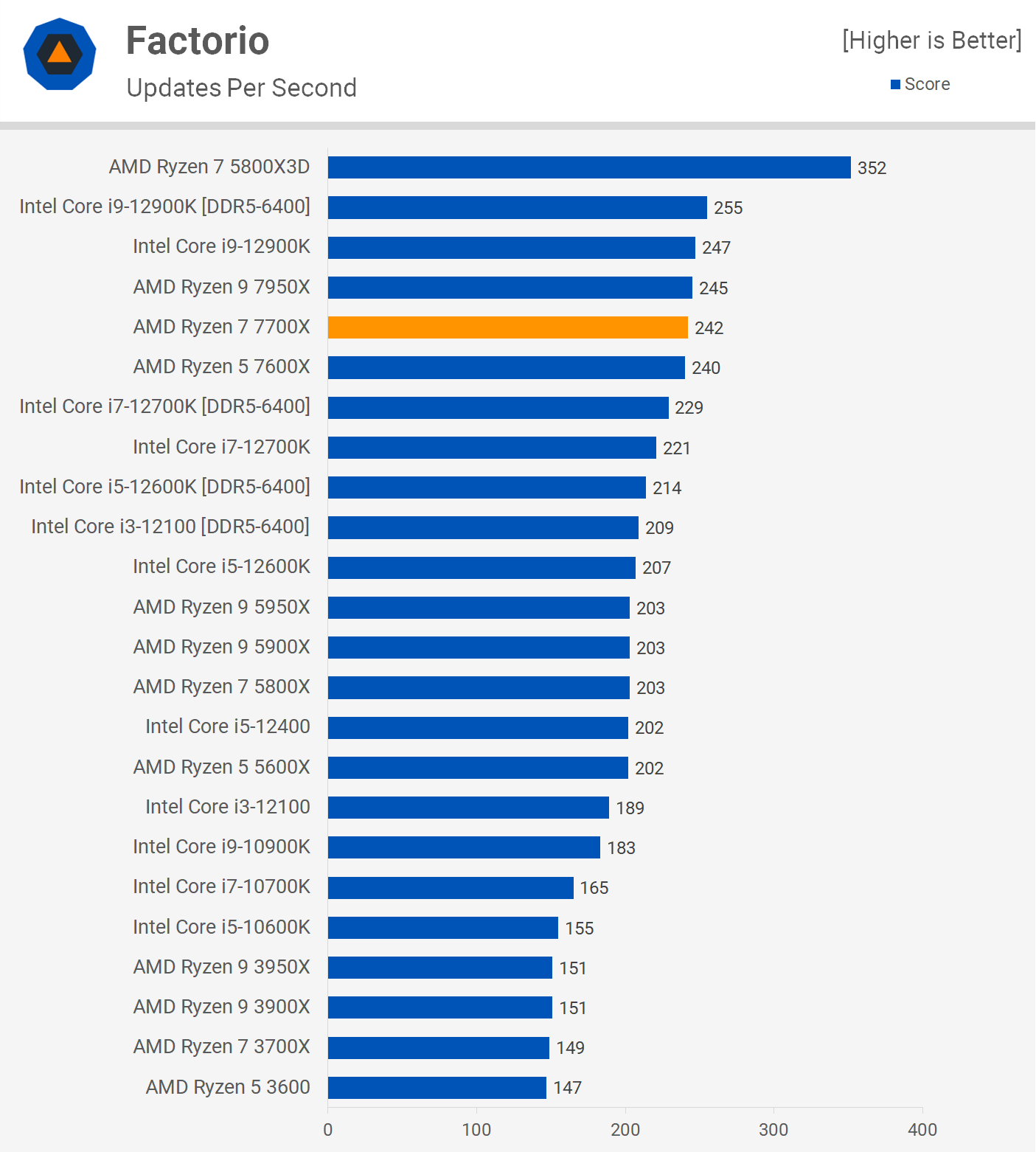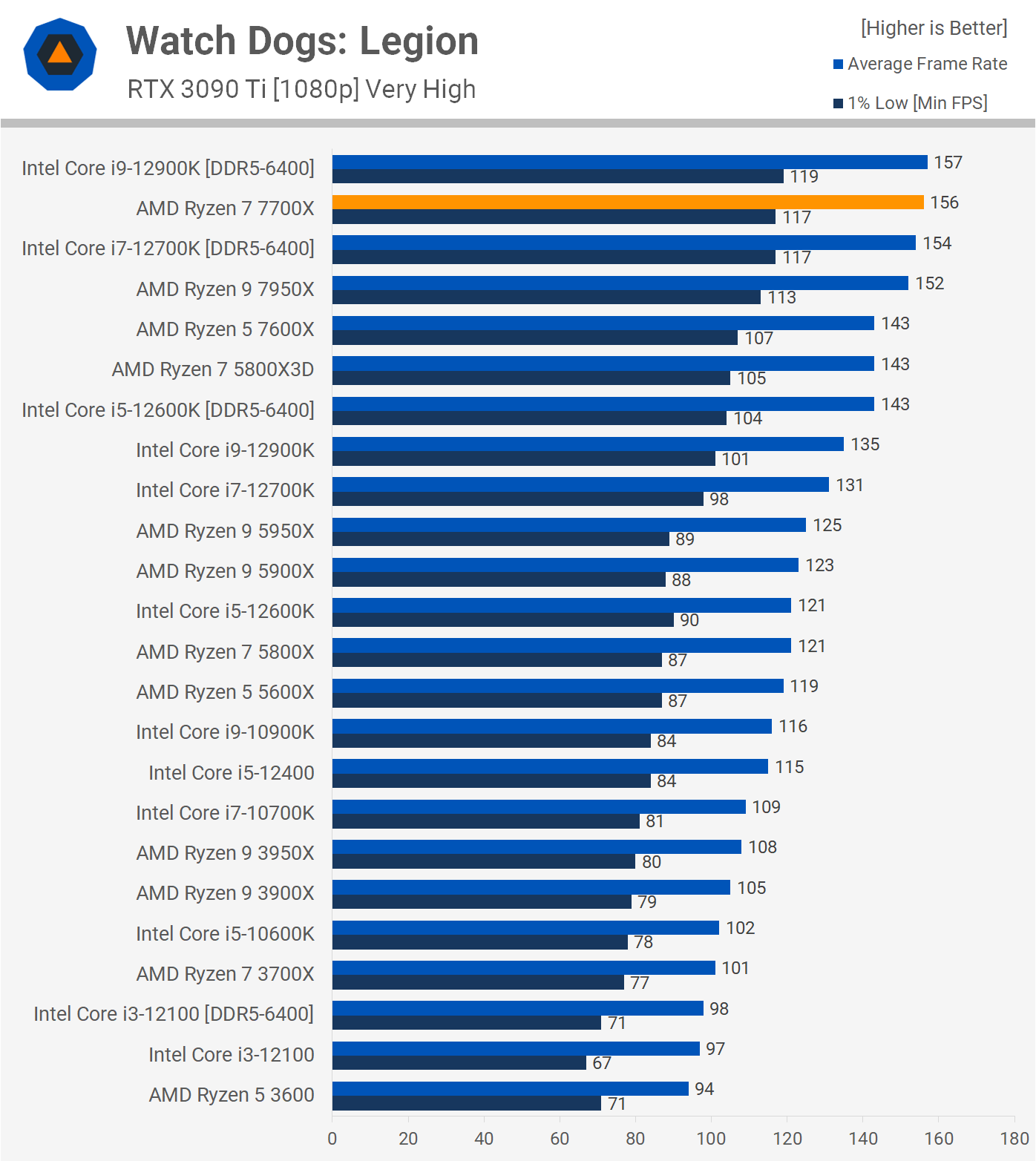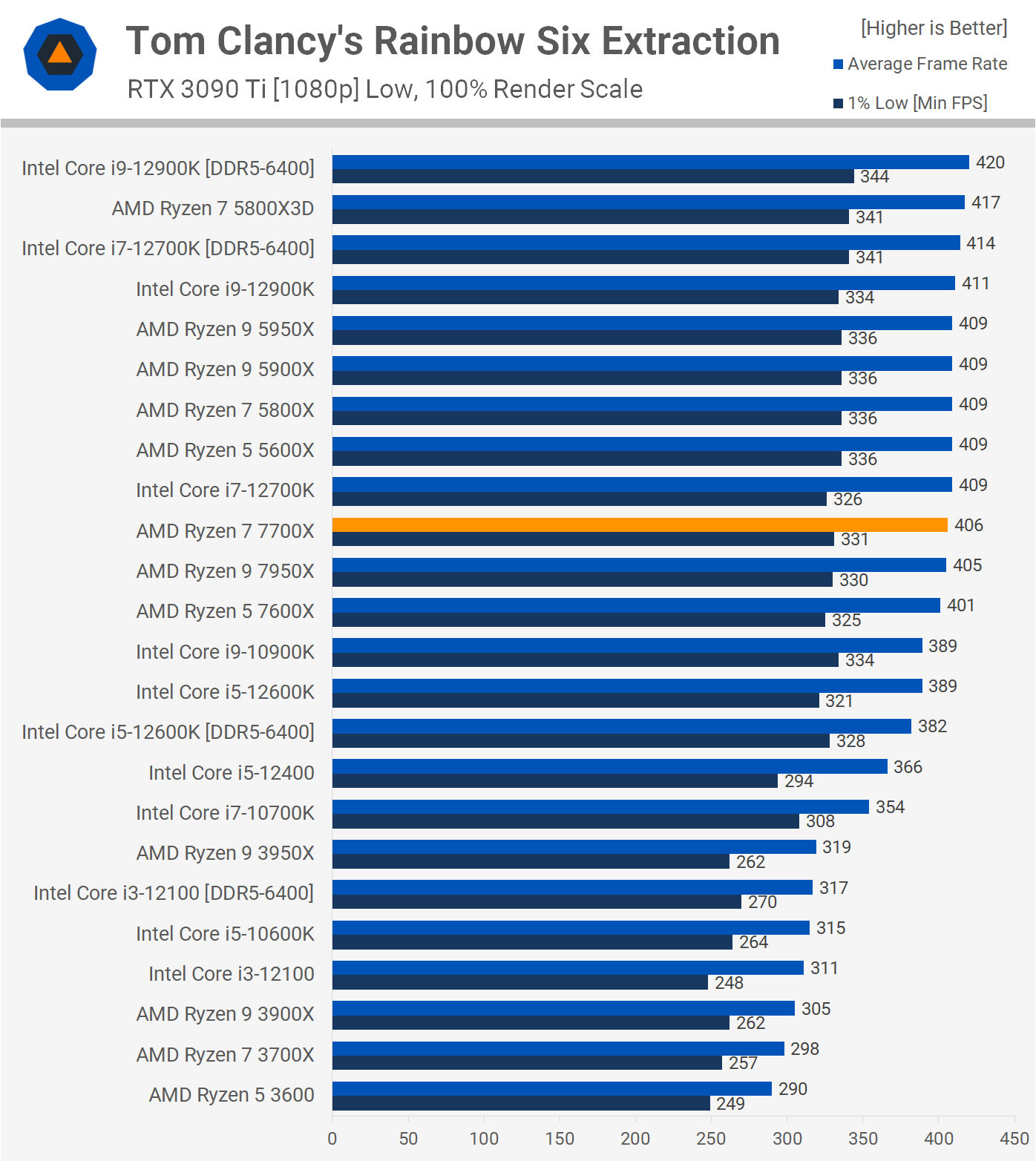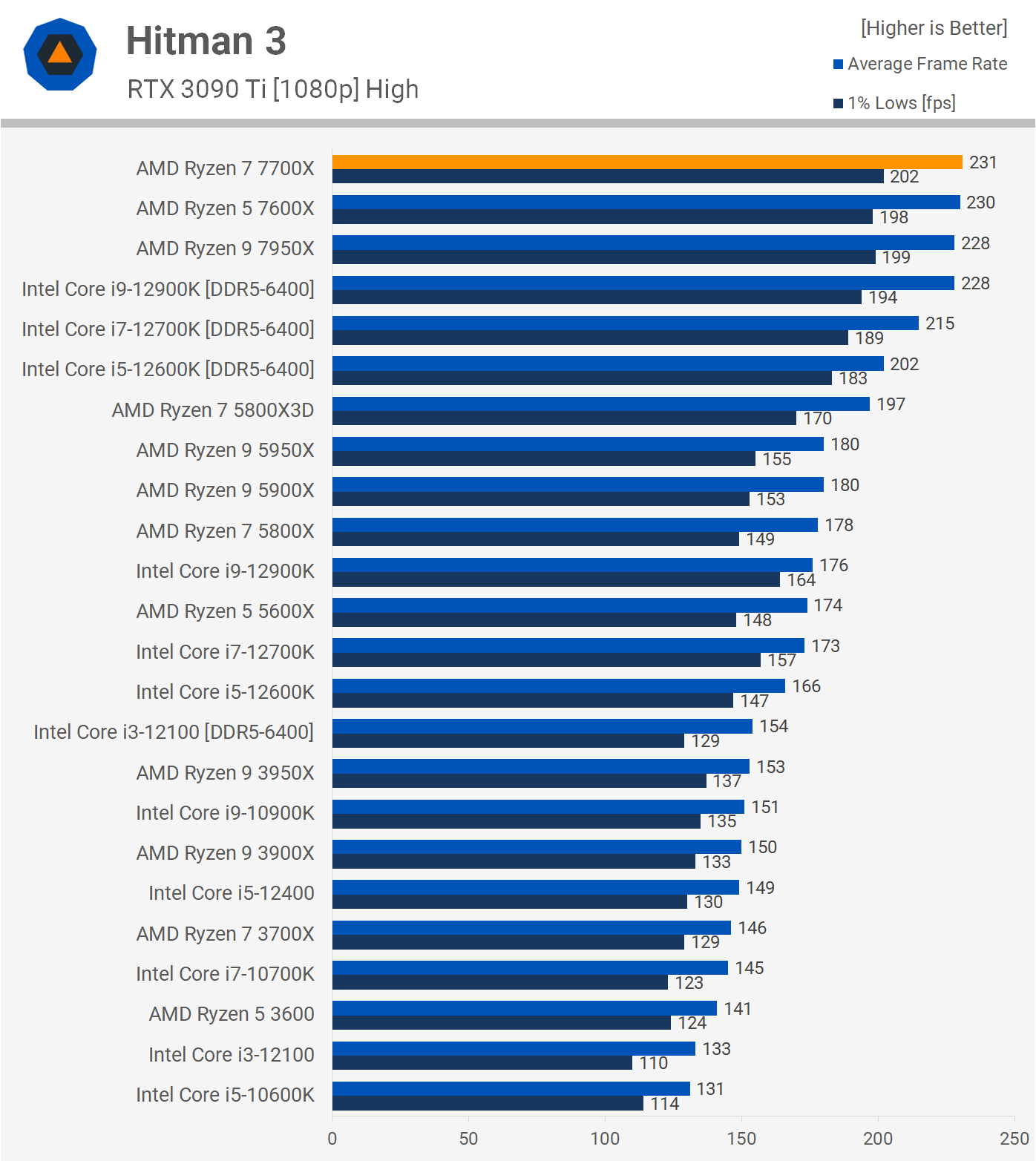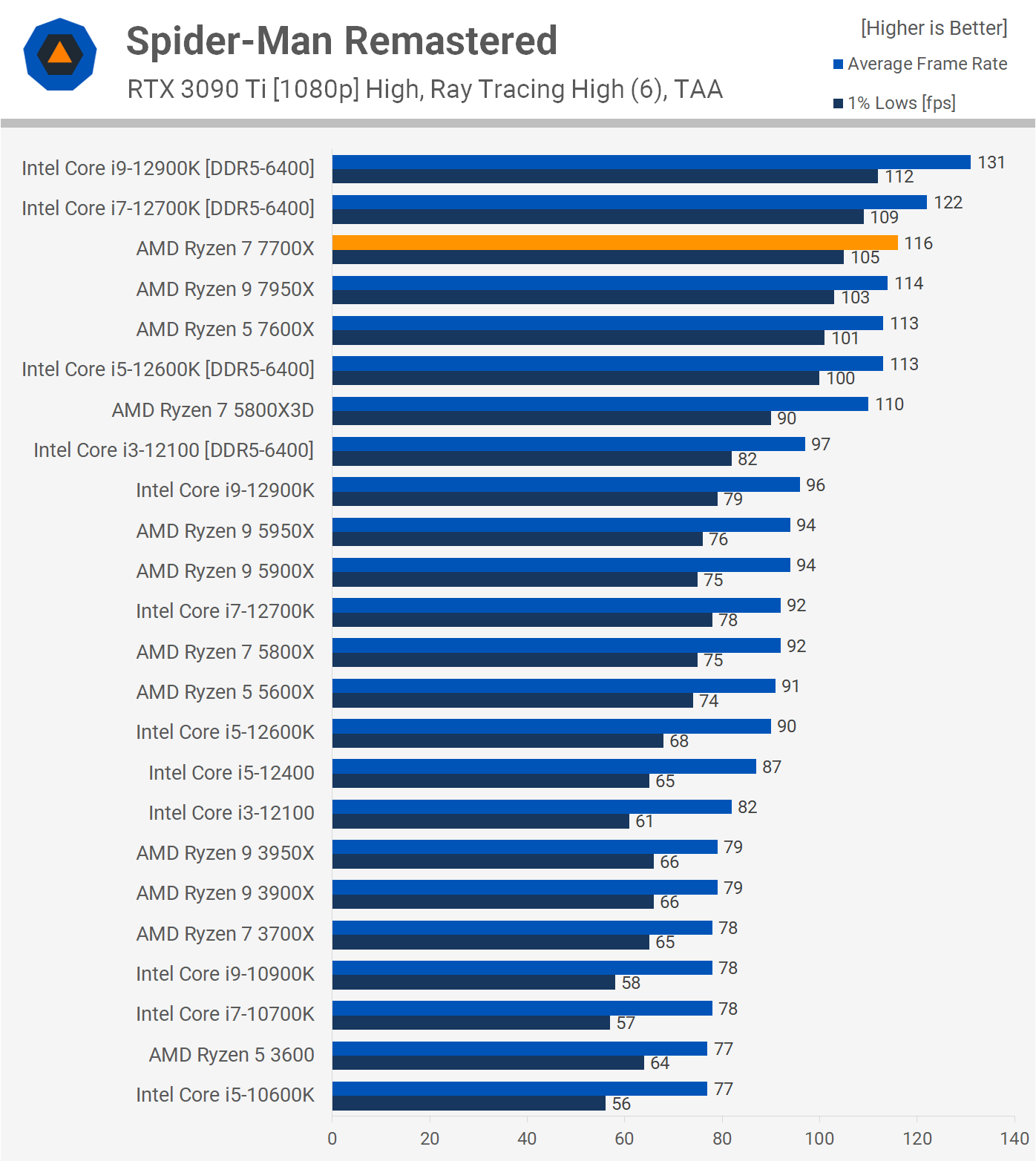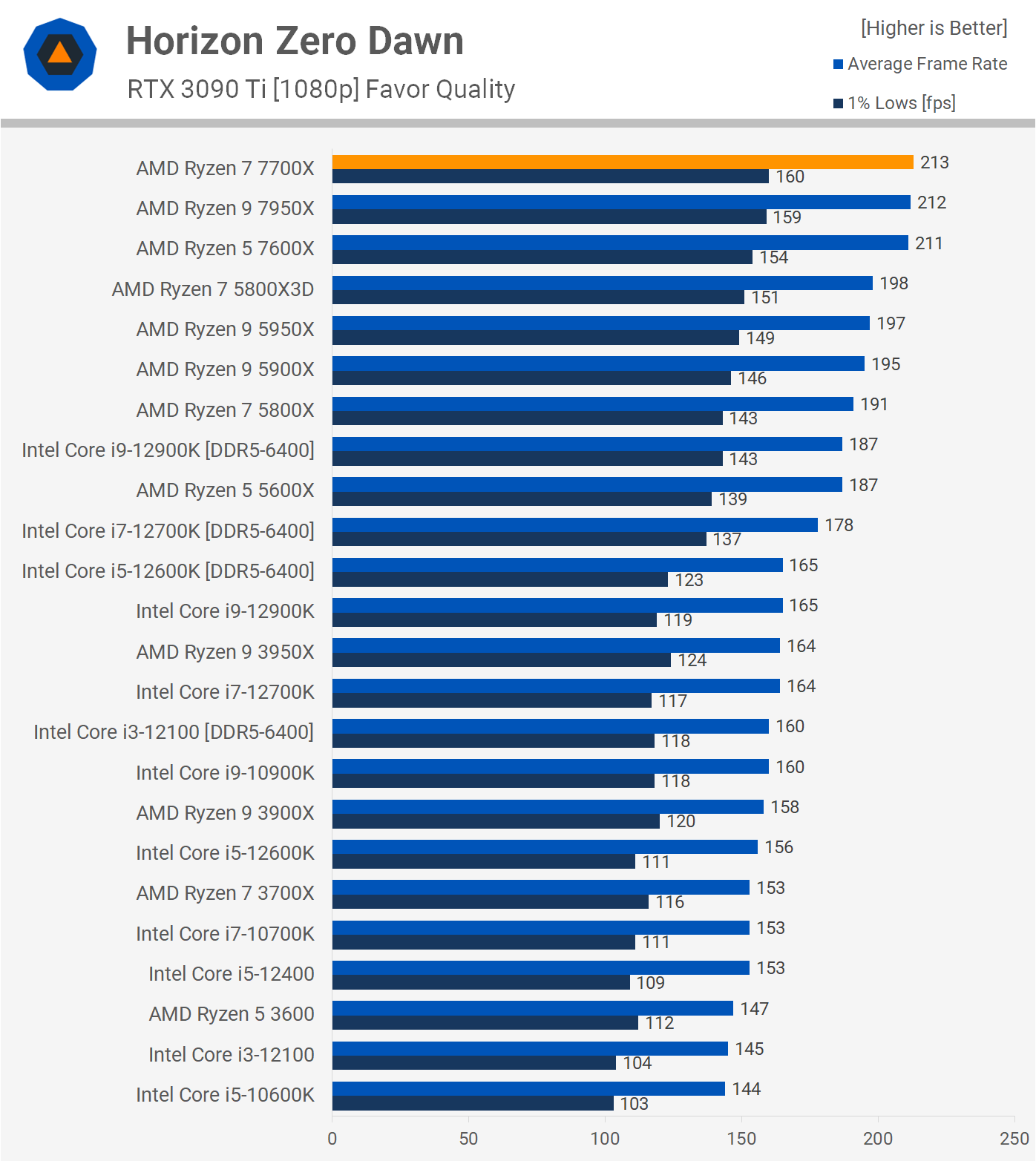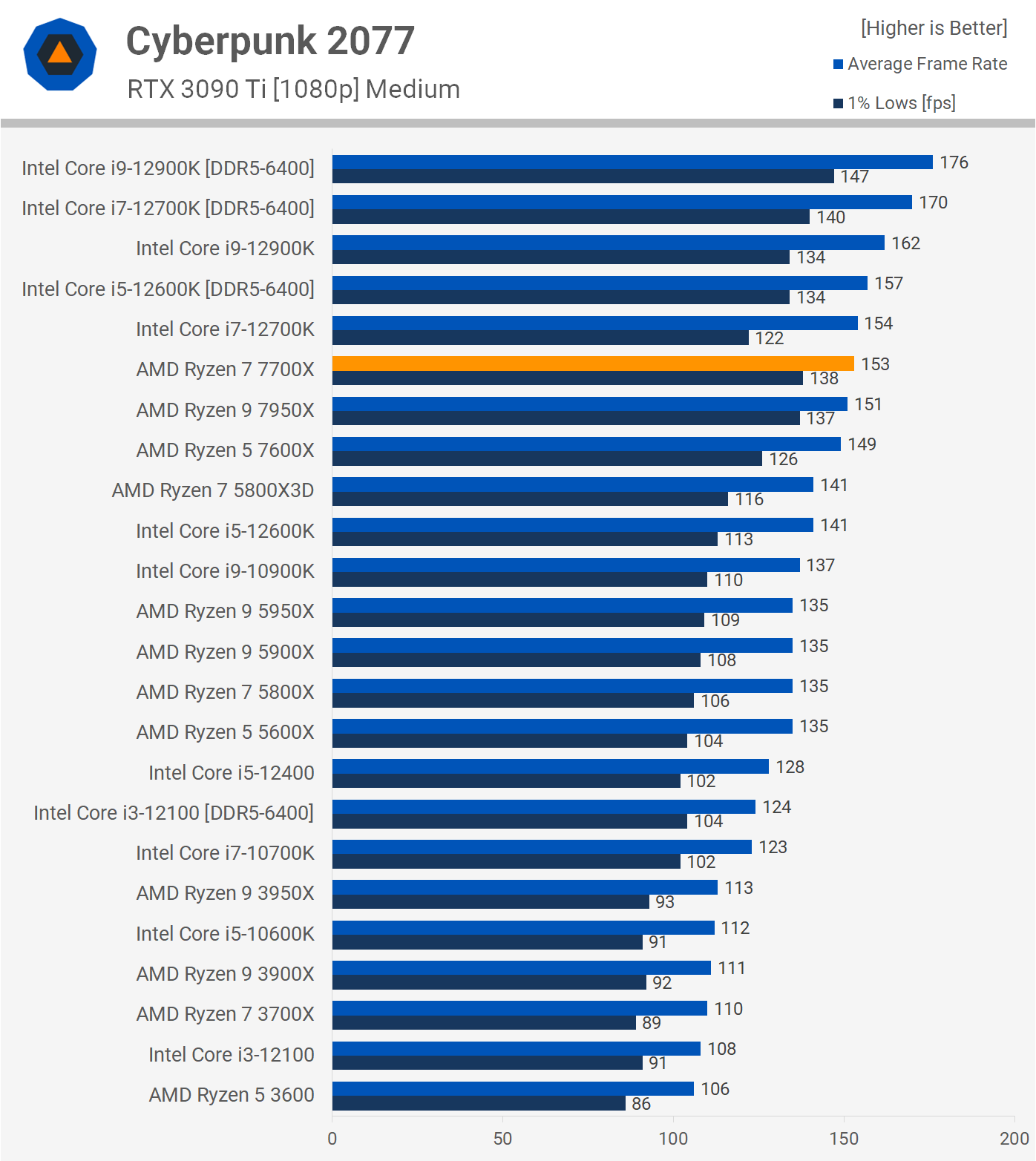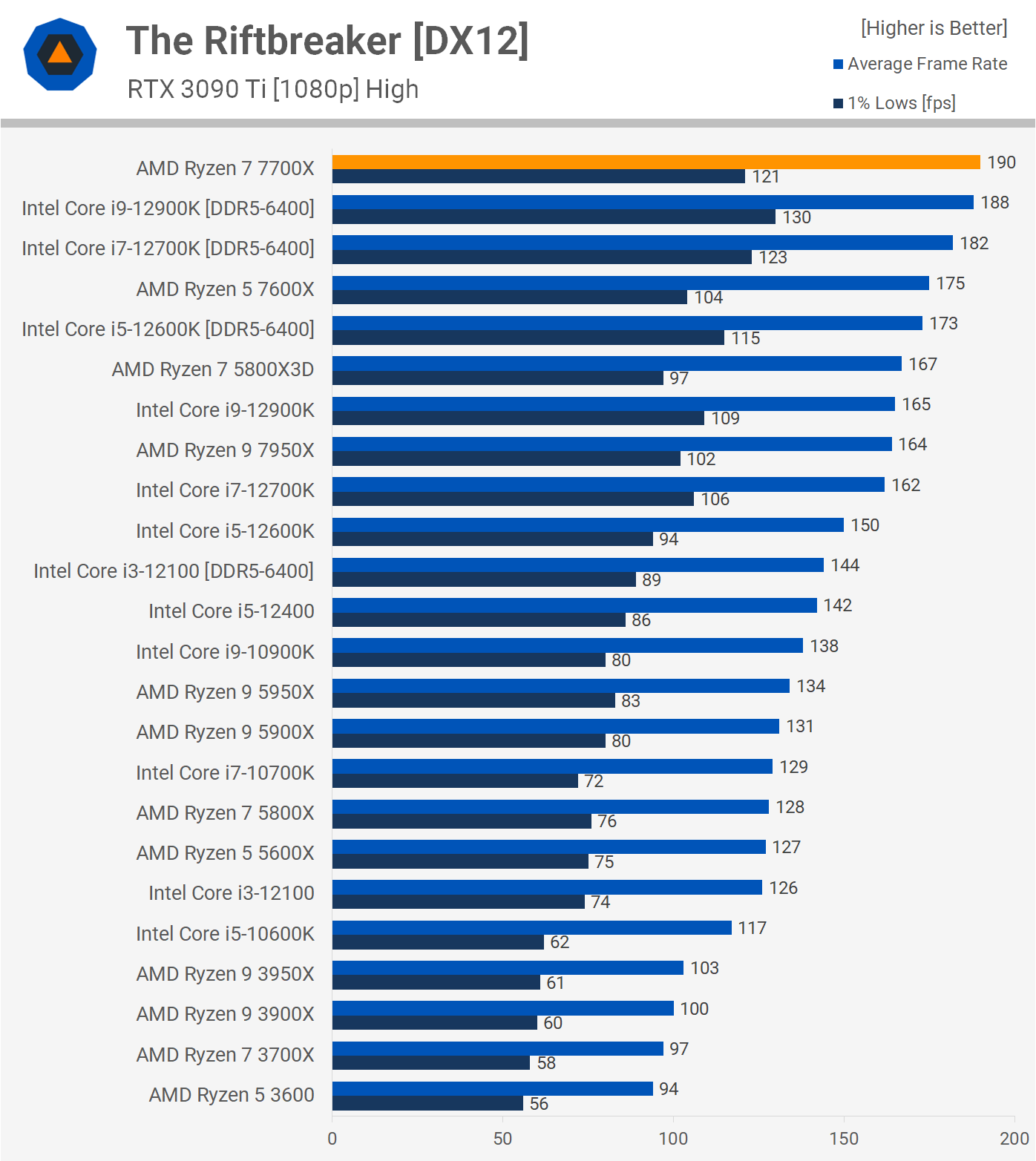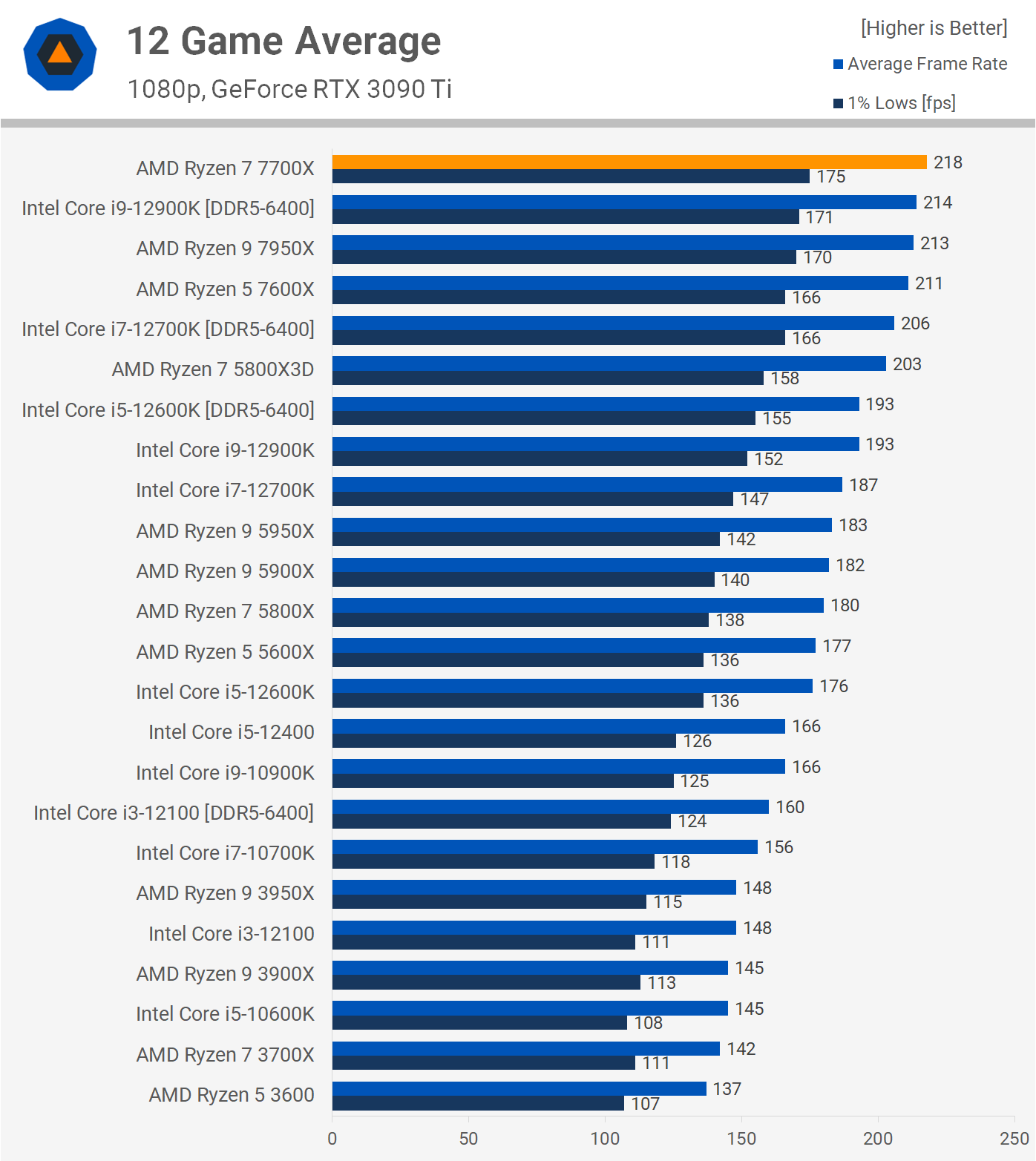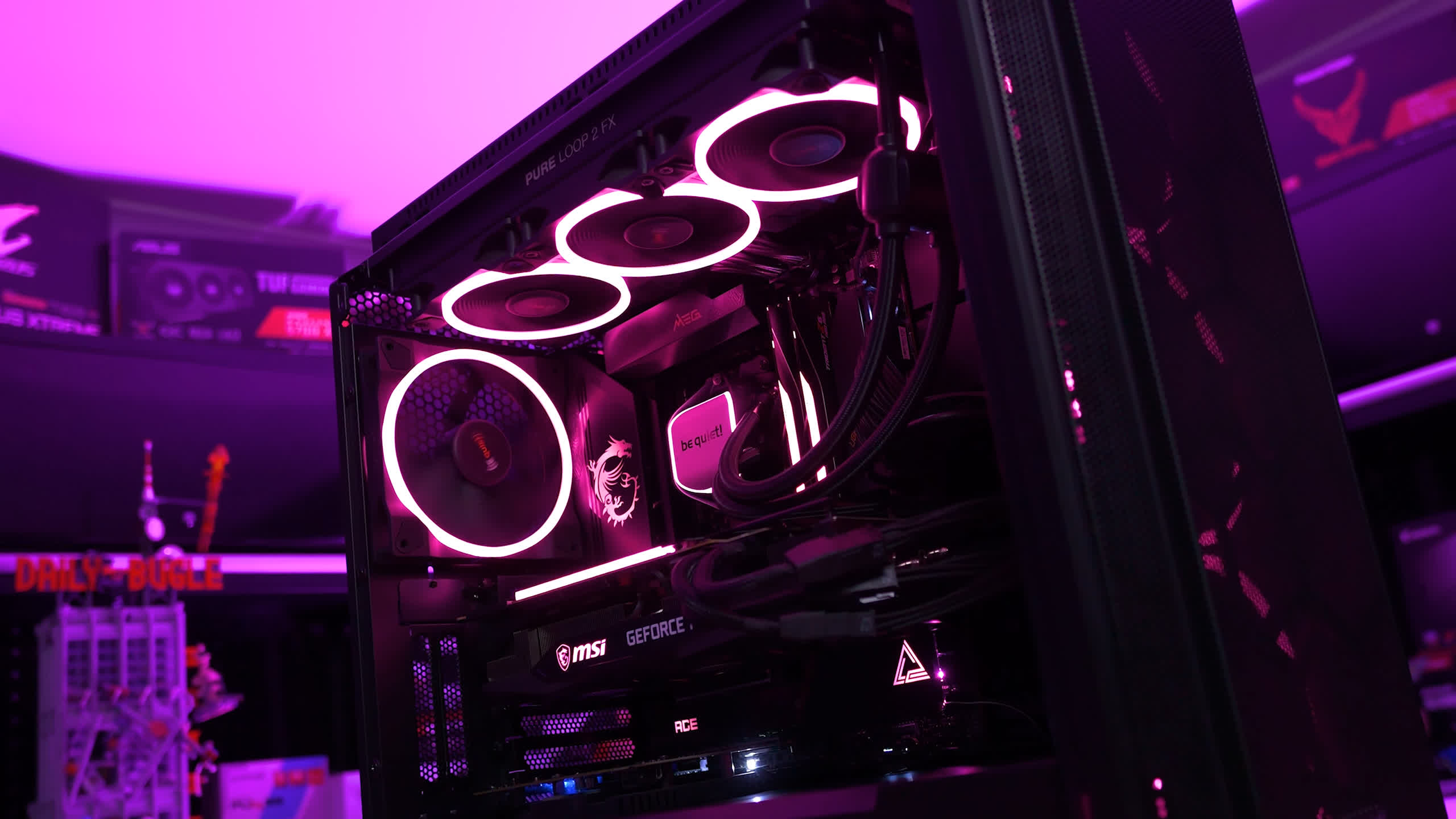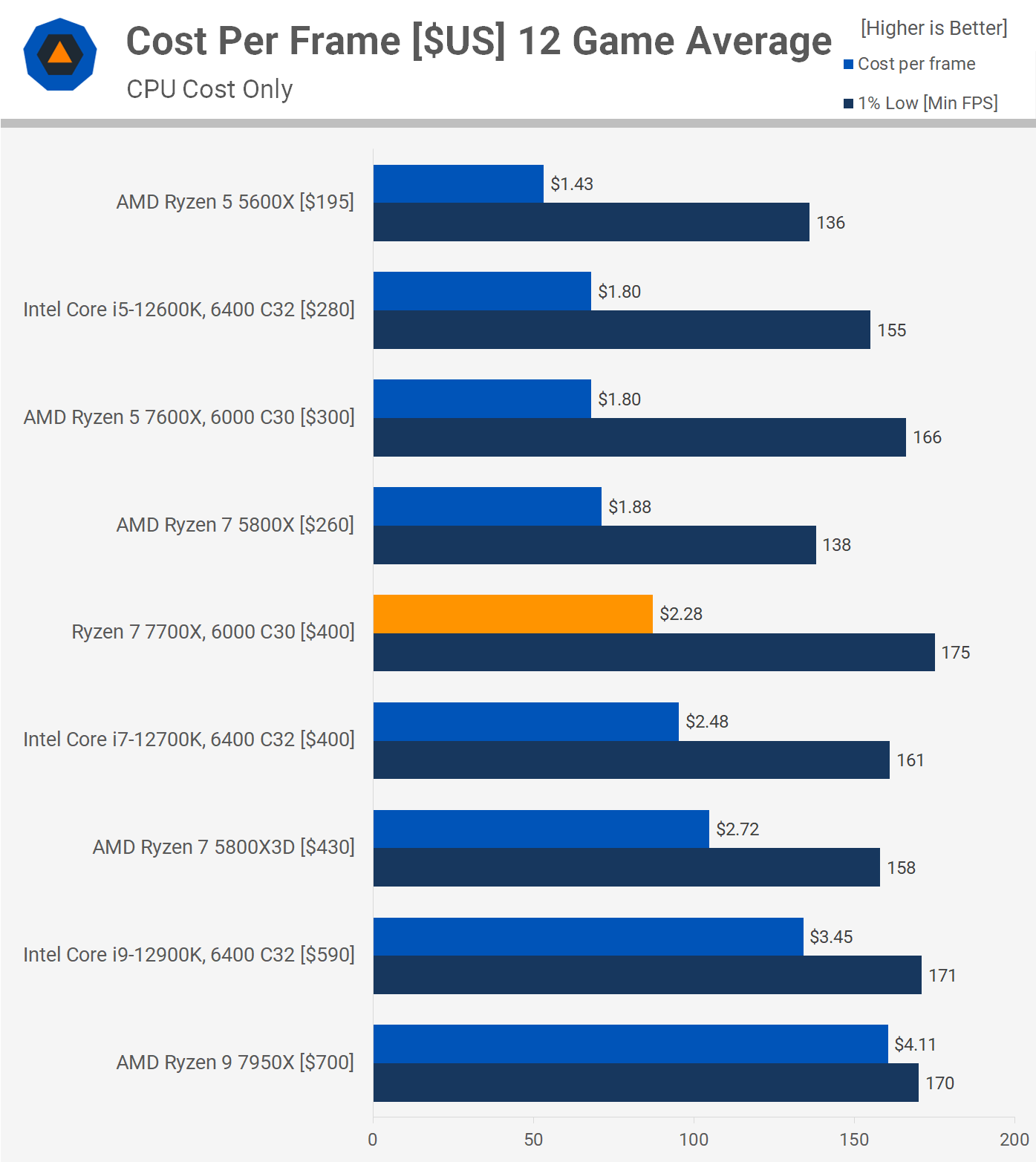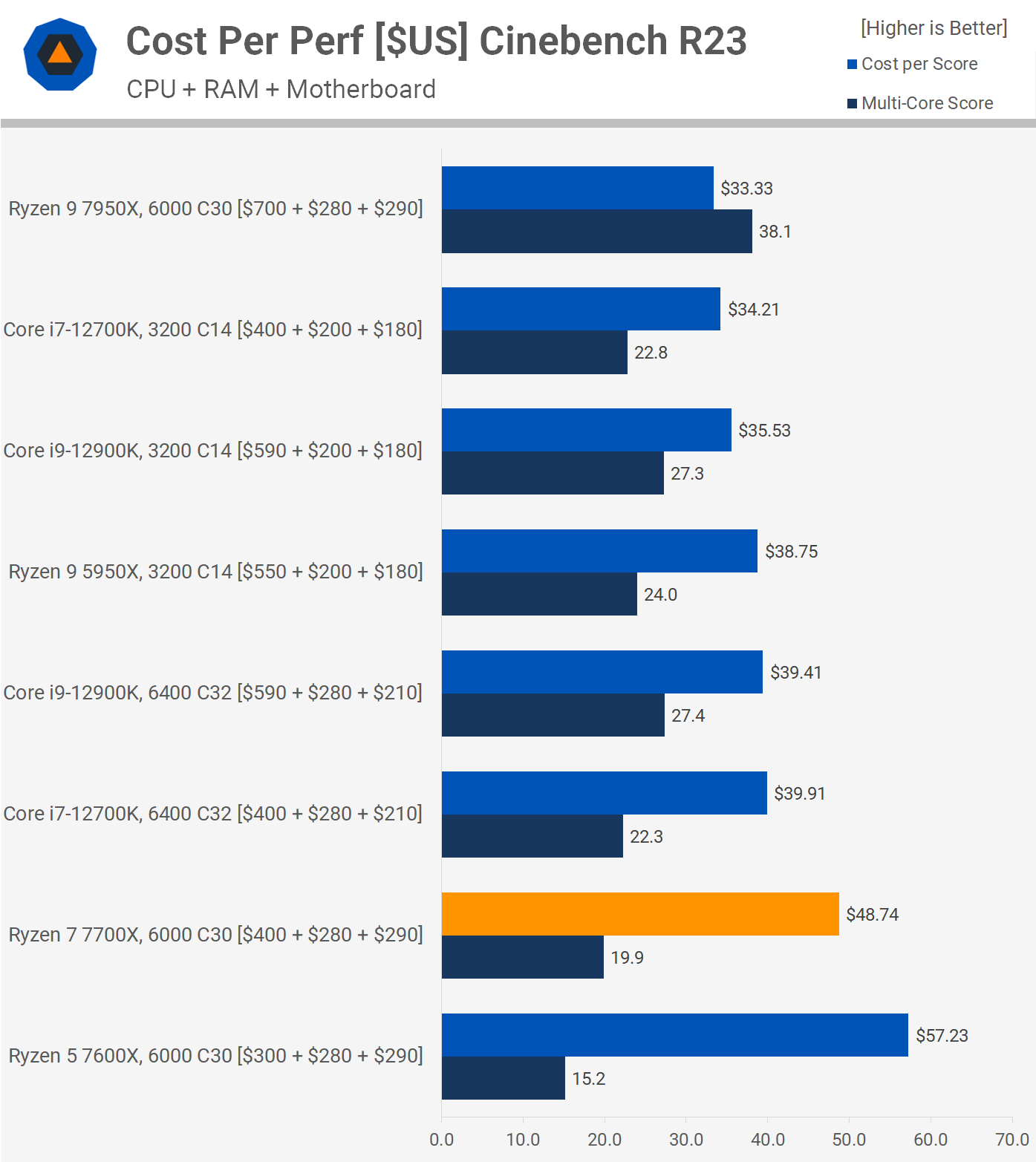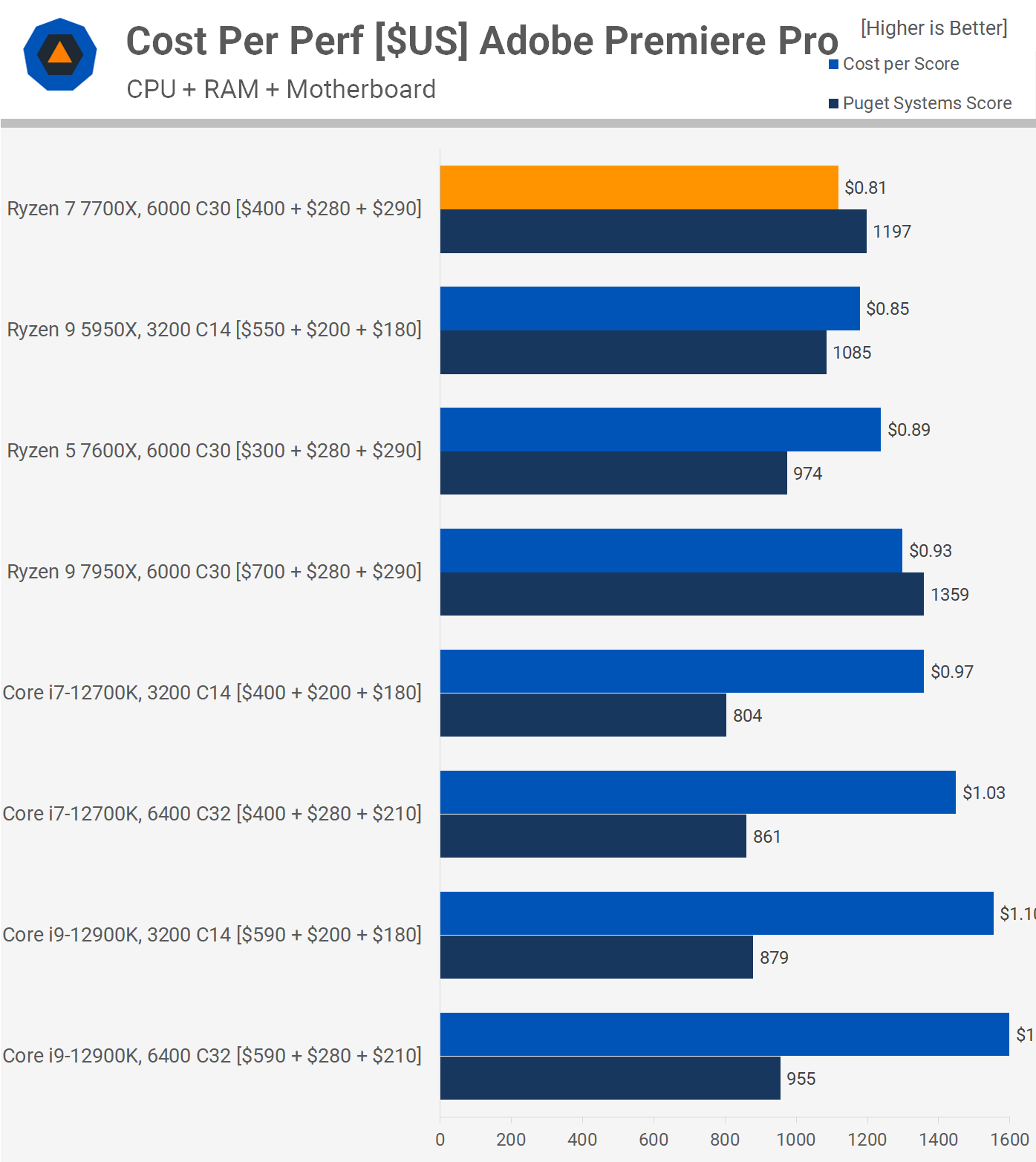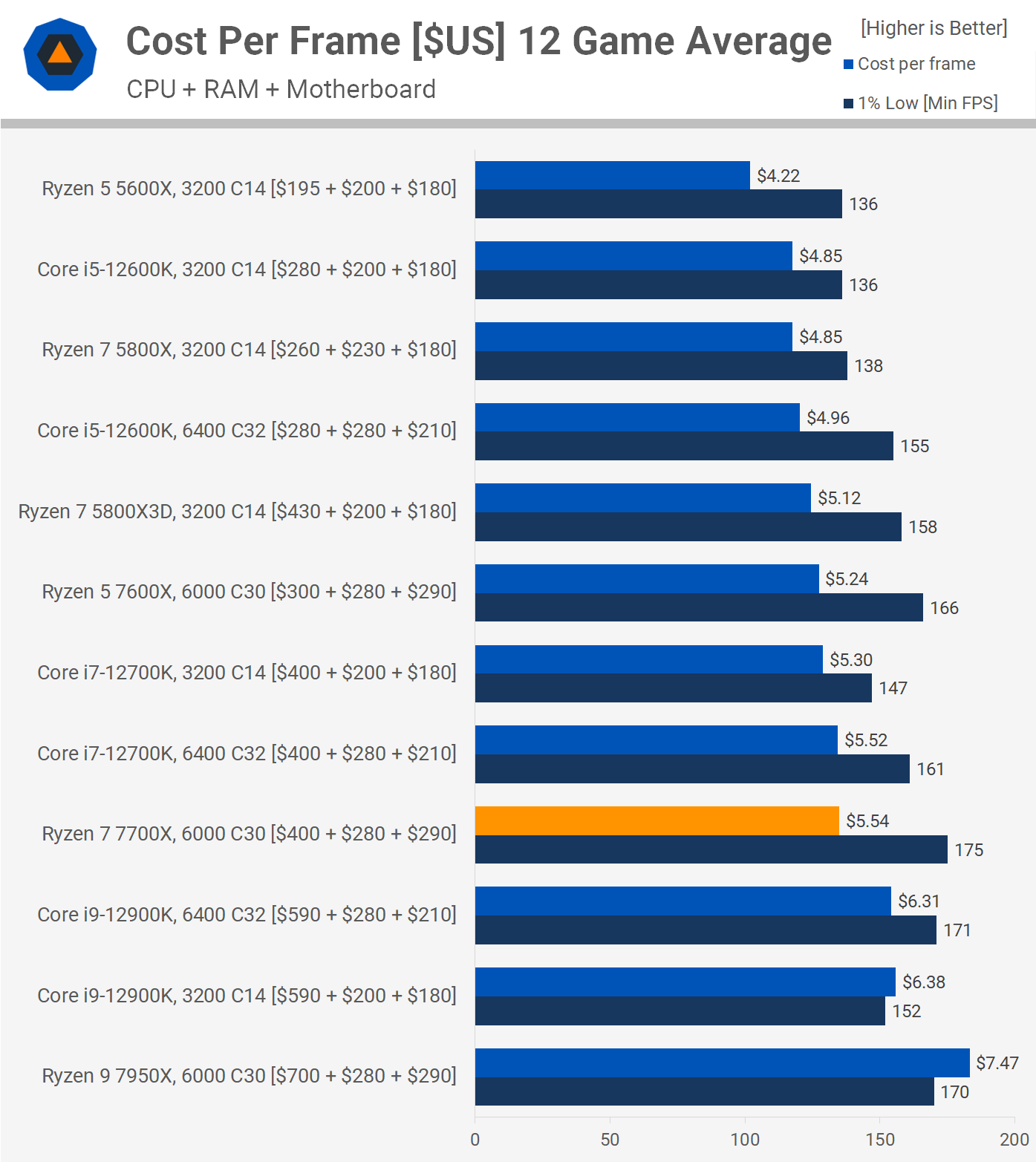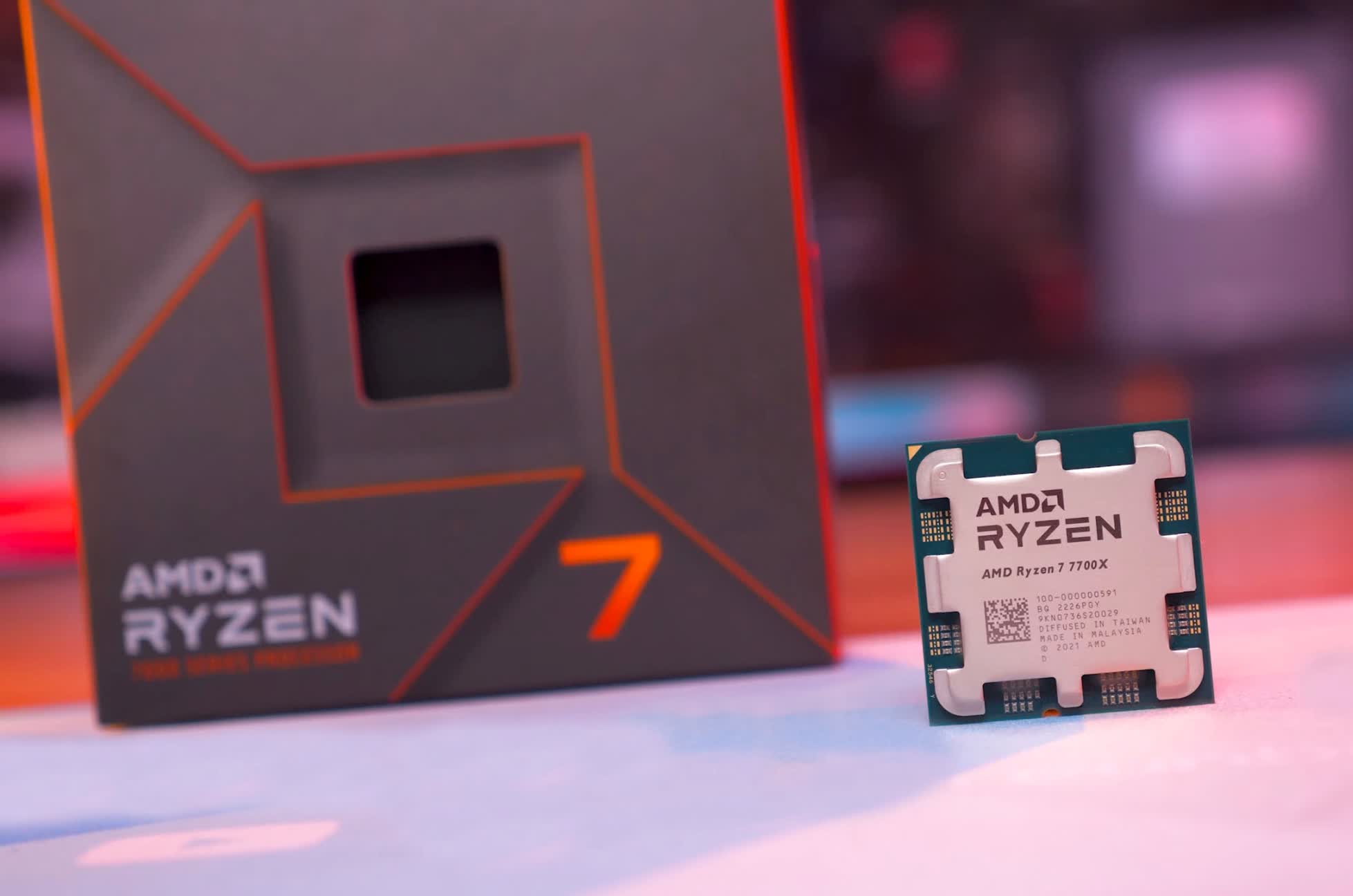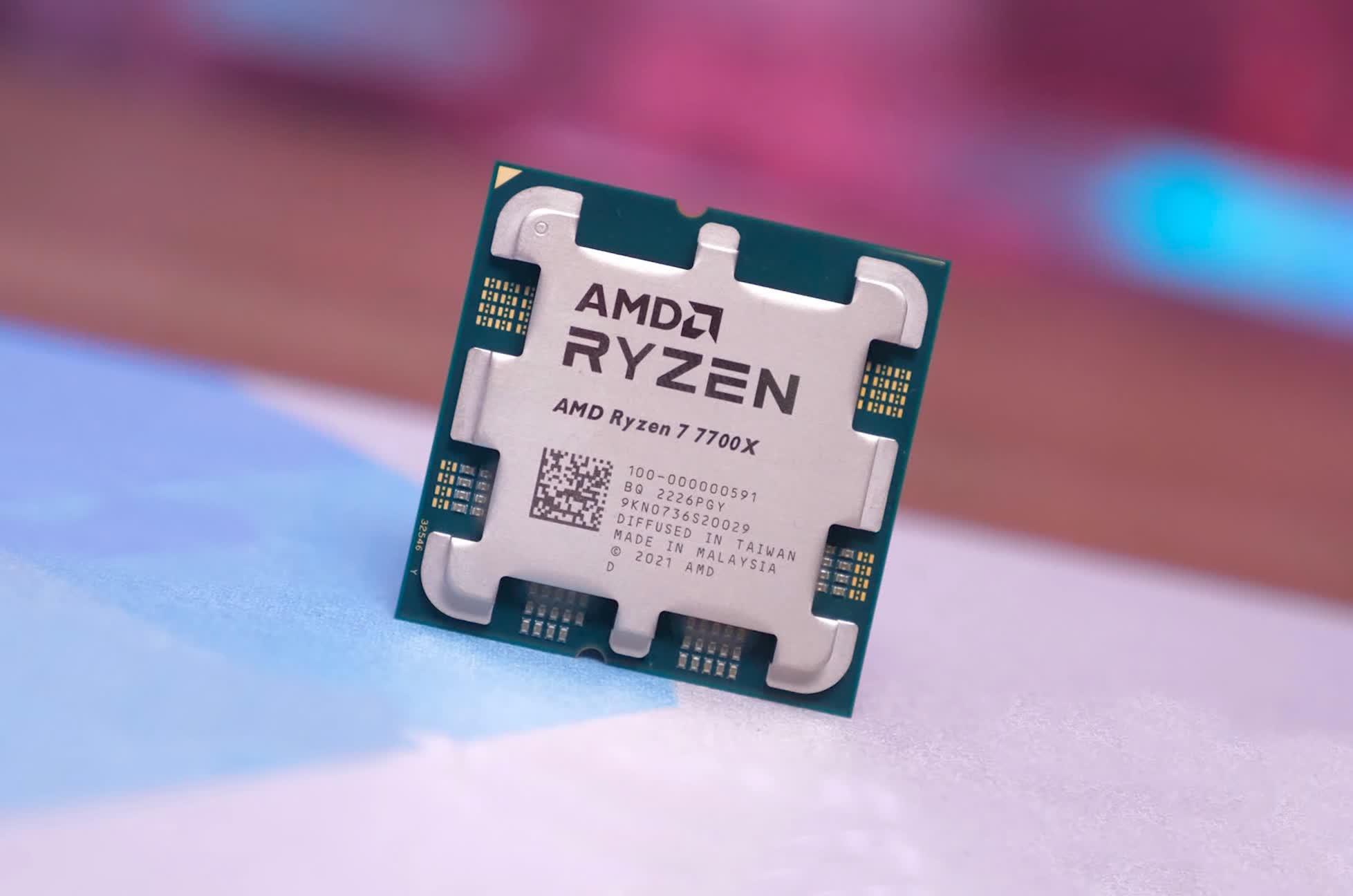Continuing with our AMD Zen 4 review tour, this time we're putting the new Ryzen 7 7700X to the test. From a gaming perspective, this is the CPU we've been most interested to examine: it's an 8-core, 16-thread chip using a single CCD, which should mean when it comes to gaming it's going to deliver the best performance.
The Ryzen 7 7700X clocks between 4.7 GHz and 5.4 GHz depending on the load, it's composed of a single 5nm core complex die with a 6nm I/O die, packs 32MB of L3 cache, 6MB of L2, DDR5 support, 28 PCIe 5.0 lanes, a 105w TDP, and is designed for AMD's new AM5 platform.
This CPU succeeds the Zen 3-based 5800X, which was also an octa-core and featured a launch MSRP of $450. The Ryzen 7 7700X is launching at $400, which is an 11% discount for what should be a much faster processor. Of course, at present the 5800X can be had for as little as $260, which remains a solid option for those on the AM4 platform that are looking to upgrade.
A closer rival in terms of pricing for the 7700X could be the 5800X3D, which currently costs $430, slightly more than the 7700X and that's going to make for a very interesting match up.
We have 17 CPUs set up for comparison: for the AM4 platform we have a range of Zen 2 and Zen 3 CPUs, then we've got the Intel 10th-gen Core series including popular Core i5, i7 and i9 models. We have skipped Intel's 11th-gen series and instead focused on 12th-gen Alder Lake with tests using both DDR4-3200 dual-rank CL14 memory and DDR5-6400 single-rank CL32 memory, with models going from the Core i3-12100 up to the Core i9-12900K.
The AM5 platform was represented by the MSI MEG X670E Ace motherboard using what AMD said was an ideal RAM setup with DDR5-6000 CL30 memory. All testing was conducted using the GeForce RTX 3090 Ti, Windows 11, and Resizable BAR was enabled for all configurations.
Clock Speeds
As we've shown with other Zen 4 CPU reviews, here's a look at clock behavior in Cinebench. After an hour of load testing, the 7700X maintained an all-core frequency of 5.1 GHz. This was sustained using the be quiet! Pure Loop 2 FX 360mm liquid cooler installed inside the Silent Base 802 case.
For single core workloads the 7700X appeared to maintain a clock frequency of 5.55 GHz, so 150 MHz above the advertised clock frequency.
Application Benchmarks
In Cinebench R23 we find the 7700X roughly matching the previous generation's 12-core part, the 5900X, coming in just 3% slower. This makes it 13% slower than the 12700K, which can be had for the same price, suggesting that the productivity benchmarks might not be all that smooth sailing for the new 8-core Zen 4 processor.
Single-core performance is slightly better than the 12700K, though only ever so slightly, but in terms of single core performance it does make the 7700X one of the best CPUs on the market right now.
Performance in 7-Zip is amazing, as has been the case with all Zen 4 processors that we've looked at so far. Here it can be seen beating the 16-core 3950X while coming in behind the previous generation 16-core 5950X by a mere 7% margin, half the cores yet just 7% slower, that's an amazing result. All that said, it was still 8% slower than the 12700K, so despite offering a huge leap forward from the previous generation, it's a little disappointing compared to Alder Lake given the price.
AMD's SMT is far more powerful for decompression work and as a result the 7700X crushes the 12700K in this opportunity, offering nearly 20% more performance and matching the Core i9-12900K.
The Blender Open Data results place the 7700X alongside the 3900X and 12700K, a great result as it was just 10% slower than the 12-core 5900X. Therefore when compared to its predecessor, the 5800X, the 7700X is 27% faster.
The Corona benchmark results are also impressive as the 7700X nudged ahead of the 3900X, 10900K, and beat the 5800X by a 21% margin. Disappointingly, it was 7% slower than the 12700K. That's not a massive margin but given they both cost $400 you'd hope AMD could have beaten what is essentially a year-old competitor at this point.
We've seen the Ryzen 9 7950X dominate the Premiere Pro benchmark before and here we can see that the 7700X is just as impressive, beating even the 5950X by a 10% margin and crushing the 12700K by almost 40%.
The Photoshop results are splendid. Here the 7700X was 19% faster than the 12700K and 28% faster than the 5800X. This makes it the fastest CPU we've ever tested as it managed to beat even the 7950X.
The Ryzen 7 7700X performed well in Adobe After Effects, though it wasn't quite as dominant, only nudging ahead of the 12700K. It was much faster than the 5800X though, offering a little over 30% greater performance.
Code compilation performance shows the 7700X doing well again, matching the 12700K depending on the memory configuration used by the Intel Alder Lake CPU. An impressive result that made it 8% faster than the 5900X and a massive 50% faster than the 5800X.
Gaming Benchmarks
Time for the gaming benchmarks and we'll start with Factorio, which is very cache sensitive and only looks at single core performance. The Ryzen 7 7700X slots right between the 7600X and 7950X making it one of the faster CPUs we've tested in Factorio and around 6% faster than the 12700K, a solid result overall.
The 7700X was mighty impressive in Watch Dogs Legion, jumping ahead of the 7600X by a 10% margin and even edging out the 7950X. This placed it roughly on par with the 12900K using DDR5 memory and a massive 30% ahead of the 5800X.
It's rare and almost unheard of to see a single CPU generation boost gaming performance by this much, especially given Zen 3 was no slouch.
Next we have Rainbow Six Extraction and as we've seen previously with other Zen 4 chips, the 7700X isn't amazing in this title. While this more middle of the pack result looks average, it's worth noting that the 7700X is within 3% of the fastest tested CPU, the 12900K using DDR5 memory, so it's not a bad result at all.
The Ryzen 7950X and 7600X results were already impressive in Hitman 3 and with the 7700X we're getting more of the same as it managed to nudge ahead by just a few frames.
This did mean that the 7700X was 7% faster than the 12700K using DDR5 memory, not a massive win, but it was impressive to see the Zen 4 CPU come out on top.
Tiny Tina's Wonderlands is a good representation of how CPU demanding many modern games are. This game can be useful for testing low-end CPUs, but for the 7700X it just shows us that we're able to max out the RTX 3090 Ti here, matching other high-end CPUs.
Moving on to F1 22, we see that the 7700X pushes further ahead hitting 343 fps on average making it 18% faster than the 12700K and impressively 7% faster than the 5800X3D.
We're also looking at a massive 28% uplift from the 5800X, which is another ~30% generational leap for gaming from AMD.
In Spider-Man Remastered results are good despite the fact that the 7700X trails the 12700K by a 5% margin. A bit disappointing in that regard, but when compared to the previous Ryzen generation, it's mighty impressive offering 26% more performance than the 5800X.
It appears as though we've reached the limits of the RTX 3090 Ti in Shadow of the Tomb Raider using the highest quality preset at 1080p. Even the 1% lows are no longer improving, at least beyond a frame here and there. Compared to the 12700K, we're looking at a similar average frame rate with a minimal boost to 1% lows.
The Zen 4 CPUs have all been impressive in Horizon Zero Dawn and while the 7700X takes out top spot here, it was just 1% faster than the 7600X. The gain over the 5800X wasn't big either, though 12% is nothing to scoff at, but the 20% gain over the 12700K was far more impressive.
When compared to the 7600X, the 1% lows of the 7700X are much better in Cyberpunk 2077 and yet despite that it's still much slower than competing Alder Lake parts such as the 12700K, trailing by a notable 10% margin with 153 fps on average opposed to 170 fps.
We've seen before how the 5800X3D is a beast in ACC, rushing everything and Zen 4 hasn't changed that, at least not these non-3D V-Cache models. The 7700X trailed the 5800X3D by a 12% margin, though it was still 14% faster than the 12700K.
The Riftbreaker isn't too forgiving for Ryzen processors and there appears to be a bug with the dual CCD on the 7950X, which AMD says the developer is looking into. The 7950X should be able to match the 7700X and that would make it one of the fastest CPUs in this title.
The 7700X didn't crush the competition, but it was able to pull ahead of the 12700K by a 4% margin which is a solid result considering how uncompetitive Zen 3 is in this title.
The Ryzen 7 7700X is very fast in Counter-Strike: Global Offensive, taking out top spot, beating even the 7950X. We're looking at an impressive 543 fps, making it a massive 29% faster than the 12700K and almost 50% faster than the 5800X, so that's a stellar result to say the least.
12 Game Average Performance
The Ryzen 7 7700X has come out strong in gaming tests as we had expected, taking top spot in our testing, narrowly beating the 12900K using DDR5 memory by a 2% margin.
Then when compared to the similarly priced 12700K, it was 6% faster and a massive 21% faster than the previous-gen 5800X. It's encouraging to see that all three Zen 4 CPUs tested so far are faster than the 5800X3D, and that's not something we were expecting to find going into this testing.
Power Consumption
Here's a quick look at power consumption for an all-core workload. The Ryzen 7 7700X pushed total system power usage slightly higher than the 5900X, but did manage to come in under the 12700K. In a nutshell, the 7700X is not better than either CPU in terms of performance per watt, at least for all core workloads like we see here with Blender.
Cooling Performance
When it comes to cooling, Zen 4 CPUs give the impression that they're difficult to cool by delivering as much performance as possible by taking full advantage of the thermal and power headroom. AMD says with the new AM5 platform and higher TDP, Zen 4 processors will run into a thermal wall before they hit a power wall. This means under heavy load they'll sit at TJMax which is about 95 degrees Celsius for the Ryzen 7000 series, and this will be particularly true for the 12 and 16-core models.
AMD has stressed that this behavior is by design and it's important to note TJMax is the maximum safe operating temperature – not the absolute maximum temperature. AMD went on to say that 95C is not running hot, rather Zen 4 will intentionally go to this temperature under load because the power management system knows that this is the ideal way to squeeze the most performance out of the chip without damaging it. The processors are designed to run at TJMax 24/7 without risk of damage or deterioration they added.
On the upside, almost all AM4 coolers will be compatible with AM5, except for those that are secured from the rear side of the motherboard as the backplates aren't removable on AM5 boards. This means that all coolers can be installed without requiring rear access to the motherboard, as is the case with HEDT processors, so that's good news.
For testing we used the be quiet! Pure Loop 2 FX 360mm liquid cooler which is fully AM5 compatible. After an hour of looping Cinebench R23 multi-core, we recorded a peak CPU temperature of 97C, just above the 95C TJMax that AMD says the CPU targets for maximum performance. It will be interesting to revisit Zen 4 later using a range of coolers to see how cooling performance affects CPU performance. But that's an investigation for another time.
Cost vs. Performance
Now lets do a value analysis, starting with the cost per frame of just the CPU. The 7700X is on average only 5% faster than the 7600X, but costs 33% more which makes sense as you are getting 33% more cores. For gaming though that much CPU power isn't required and probably won't be for some time, so the 7700X comes in at a 27% price premium per frame. Still, when compared to competing Intel parts such as the 12700K and 12900K, the 7700X is better value when just looking at the CPU cost.
Taking a look at cost per frame while including memory and motherboard costs – which for the DDR4 configurations includes a 32GB kit of DDR4-3200 CL14 memory at a cost of $200, and the DDR5 configurations cost $280, regardless of the spec, both 6000 and 6400 cost the same amount.
For the motherboard, the AM5 models are based on the $290 MSI Pro X670-P WiFi, AM4 uses the Asus TUF Gaming X570-Plus WiFi which costs $180, and then the MSI Pro Z690-P DDR4 at $180 and the MSI Pro Z690-A DDR5 at $210.
Based on those prices, the 7700X isn't amazing value, but for flagship-tier performance, it still beats out the 12900K while offering similar value to the 12700K. It's also just 6% more costly per frame than the 7600X, making it an attractive option for those seeking ultimate performance.
Like the 7600X, the 7700X is weak in terms of value when it comes to core-heavy productivity, both delivering worse value than even the Core i9-12900K. The more expensive Ryzen 9 7950X is worlds better here, so if productivity is the priority then you can ignore 6 and 8-core Zen 4 options.
For mixed workloads that rely on strong single and multi-core performance, the 7700X does fare much better and takes out top spot for value in the Premiere Pro benchmark.
So when it comes to productivity it will depend on the application, but notice that the 7950X was still faster, so if time's money then that's the way you'd go.
What We Learned
The Ryzen 7 7700X looks to be the new king of gaming, at least for now, taking out the Core i9-12900K in our 12 game sample. Of course, we'll be keen to compare them head-to-head across 30+ games, and that's something we plan to do soon, though we'll wait for next-gen GPUs before sinking a week into that testing.
When compared to existing Intel Alder Lake CPUs for gaming, the 7700X appears to be the superior option from a performance standpoint, while offering a similar level of value to the 12700K, and much better value than the 12900K. That said, if you're prioritizing productivity then the choice between the Alder Lake i7 and i9 parts and the 7700X is less obvious, but in the end it may not matter as you'd just opt for the Ryzen 9 7950X which is much faster, or perhaps the 7900X which we'll be looking at next.
Perhaps a more difficult decision for prospective buyers is the choice between the 7600X and 7700X. Right now the 7600X is better value, even when factoring the entire platform cost, but if you're going to build an entire PC from the ground up, the 8-core model will only cost you a few percent more at most, so at that point you might as well part with the $100. On average, the Ryzen 7 7700X is just 3% faster for gaming, though we did see instances where it was up to 11% faster. Realistically, the 7600X is still going to be better value as gaming performance is very similar and this will almost certainly hold true for years to come, just as we've seen in the past.
Remember when 8-core CPUs were all the rave for gaming?
Remember when 8-core CPUs were all the rave for gaming? If we look at the 12 game sample, which is largely based on modern titles, the Ryzen 7 3700X is on average just 4% faster than the 3600, so even though the older CPUs are significantly slower than newer Zen 4 models, core scaling is remarkably similar. Likewise, the 3950X is just 4% faster than the 3700X, so it's almost guaranteed that within the realistic lifespan of these processors the 7950X won't overtake the 7700X for gaming, say within the next 5 to 8 years.
Keeping all of that in mind, the Ryzen 7 7700X is actually our Zen 4 recommendation for gamers. At present AM5 is an expensive platform and if you're faced with having to spend well over $200 on DDR5 memory and the same for an entry-level X670 motherboard, there's little point saving $100 on the 6-core CPU.
This recommendation will likely change with the arrival of sub-$200 AMD B650 boards and we've already got a few of those on hand, but are not allowed to show them off yet. DDR5 pricing will almost certainly continue to fall, so in a few months the 7600X should make sense as a sort of AM5 value option. For now though I would overlook it for the 7700X.
Which brings us to the conclusion that holding off for a month or two might pay in more ways than you imagine. There's cheaper DDR5 memory at play, but also to see what Intel brings to the table with Raptor Lake, their 13th-gen Core series. It will need to be exceptionally good to overthrow the 7700X and also counter the AM5 platform which will let you upgrade later.
A strong argument for spending big on a quality AMD AM5 motherboard now is that you'll still be using it in 2025 and have the option to slot a Zen 6 CPU on there for what should be a massive upgrade. With Intel, on the other hand, you will require a new motherboard in 3 years, a direction we hope they set to change in the generation that comes after Raptor Lake.
